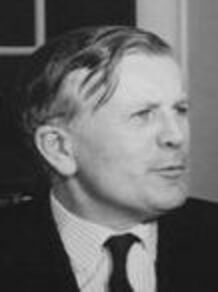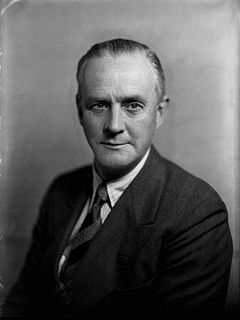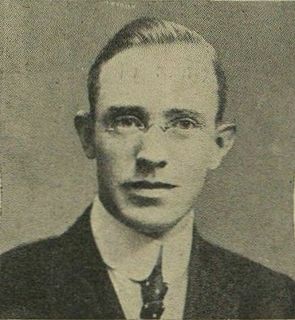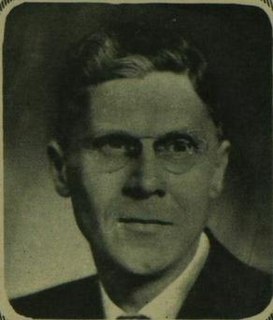Related Research Articles

The Liberal Party was one of the two major political parties in the United Kingdom with the opposing Conservative Party in the 19th and early 20th centuries. The party arose from an alliance of Whigs and free trade–supporting Peelites and the reformist Radicals in the 1850s. By the end of the 19th century, it had formed four governments under William Gladstone. Despite being divided over the issue of Irish Home Rule, the party returned to government in 1905 and then won a landslide victory in the following year's general election.

Joseph Grimond, Baron Grimond,, known as Jo Grimond, was a British politician, leader of the Liberal Party for eleven years from 1956 to 1967 and again briefly on an interim basis in 1976.

John Jeremy Thorpe was a British politician who served as the Member of Parliament for North Devon from 1959 to 1979, and as leader of the Liberal Party between 1967 and 1976. In May 1979 he was tried at the Old Bailey on charges of conspiracy and incitement to murder, arising from an earlier relationship with Norman Scott, a former model. Thorpe was acquitted on all charges, but the case, and the furore surrounding it, ended his political career.

The 1959 United Kingdom general election was held on Thursday, 8 October 1959. It marked a third consecutive victory for the ruling Conservative Party, now led by Harold Macmillan. For the second time in a row, the Conservatives increased their overall majority in Parliament, this time to a landslide majority of 100 seats, having gained 20 seats for a return of 365. The Labour Party, led by Hugh Gaitskell, lost 19 seats and returned 258. The Liberal Party, led by Jo Grimond, again returned only six MPs to the House of Commons, but managed to increase its overall share of the vote to 5.9%, compared to just 2.7% four years earlier.

Edward Clement Davies was a Welsh politician and leader of the Liberal Party from 1945 to 1956.
In the United Kingdom, the word liberalism can have any of several meanings. Scholars use the term to refer to classical liberalism; the term also can mean economic liberalism, social liberalism or political liberalism; it can simply refer to the politics of the Liberal Democrat party; it can occasionally have the imported American meaning, however, the derogatory connotation is much weaker in the UK than in the US, and social liberals from both the left and right wing continue to use liberal and illiberal to describe themselves and their opponents, respectively.

Gwilym Lloyd George, 1st Viscount Tenby, was a Welsh politician and cabinet minister. The younger son of David Lloyd George, he served as Home Secretary from 1954 to 1957.

Isaac Foot was a British Liberal politician and solicitor.

Evan Roderic Bowen KC was a Welsh Liberal Party politician.
The Torrington by-election of 1958, in Devon, England, was the first gain by the British Liberal Party at a by-election since Holland with Boston in 1929.

Donald William Wade, Baron Wade, DL was a British solicitor who became a Liberal Party Member of Parliament. Wade's time in Parliament coincided with the time the Liberals were at their lowest ebb but his job as Chief Whip kept the party operating until times were better; however, his own seat was dependent on a local pact with the Conservatives and when it broke down, he was defeated. He was then elevated to the House of Lords where he became an active Peer.

The Coventry North West by-election, in Coventry on 4 March 1976, was held after the death of Labour Member of Parliament (MP) Maurice Edelman. A safe Labour seat, it was won by Geoffrey Robinson, who retained the seat until 2019.

Ivor Roland Morgan Davies CBE was a British Liberal Party politician, journalist and United Nations Association administrator. Politically, his chief claim to fame was his decision in October 1938 to withdraw as Liberal candidate at the Oxford by-election along with the Labour candidate Patrick Gordon-Walker to allow an independent, Popular Front, anti-Munich candidate, A. D. Lindsay, the Master of Balliol, to challenge the government candidate Quintin Hogg.
Desmond Anderson Harvie Banks, Baron Banks, CBE was a British Liberal Party politician.
George Elliott Dodds was a British journalist, newspaper editor, Liberal politician and thinker.

Emrys Owen Roberts CBE was a Welsh Liberal politician and businessman.

Archibald James Florence "Archie" Macdonald was a Scottish Liberal later Conservative politician and businessman.

Charles Philip Fothergill was an English woollen manufacturer and Liberal Party politician.
Members of the British Liberal Party's Frontbench Team from 1967 to 1976 :
The Social Liberal Forum is a pressure group and think tank which seeks to promote social liberalism within Britain. The Social Liberal Forum originated as a group that represented the centre-left within the British Liberal Democrats, but membership is now open also to people who are not members of the Liberal Democrats but who share the SLF's values and principles; since 2018 this has included liberal progressives of all parties and none.
References
- ↑ Gamble in V.Bogdanor, Liberal Party Politics, (OUP, 1983).
- ↑ The Times, 5 June 1953.
- ↑ Mervyn Jones, A Radical Life (Hutchinson, 1991) p.205
- ↑ The Times, 13 February 1950
- ↑ A.Watkins, The Liberal Dilemma p.80
- ↑ The Times, 24 June 1954
- ↑ The Times, 29 April 1955
- ↑ G Tregigda, The Liberal Party in South-West Britain since 1918 (University of Exeter Press,2000)
- ↑ "Archived copy" (PDF). Archived from the original (PDF) on 2006-10-01. Retrieved 2008-04-11.CS1 maint: archived copy as title (link) G Sell, Jo Grimond's Leadership of the Liberal Party in Journal of Liberal History
- ↑ News Chronicle, 23 February 1956
- ↑ G Tregigda, The Liberal Party in South-West Britain since 1918 (University of Exeter Press,2000 p148)
- ↑ G Tregigda, The Liberal Party in South-West Britain since 1918 (University of Exeter Press,2000) pp154-155